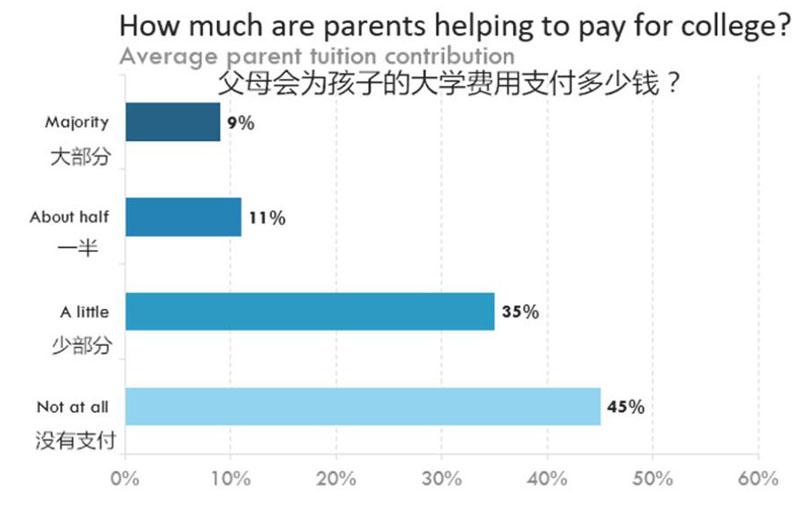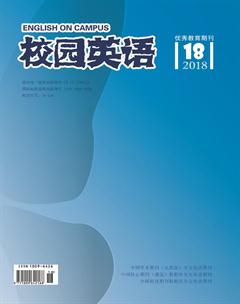Who is responsible for paying college costs, parents or children?

【Abstract】The paper tells about who takes the responsibility of paying college in China and US. It explores both American and Chinese undergraduate families attitudes towards the responsibility of paying for college. And it explore the cultural differences manifested in the way people pay for college. Then some opinions and implications are offered.
【Key words】paying college costs; attitude; cultural difference
【作者簡介】张静,上海思博职业技术学院。
During my visit at California State University Fullerton, I have learned that less than 30% undergraduates in this university can graduate within 4 years. Most of students usually take 6 or 7 years to graduate. I felt curious about that. What caused the delay of their graduation? The answer is they need do part time job to pay for their college. That is why they need more time to graduate. Do American parents pay for their children college? This aroused my interest in this topic. So I conducted a survey about it. And my research question is: who is responsible for paying college costs, parents or children? I interviewed some American parents and college students for this survey. Next Ill tell about the findings of my survey.
1.Who takes the responsibility of paying for college education?
For many Chinese families, especially those relatively well-off, the idea of who will pay for college is a given: It is the parents responsibility. But in America, things are different. According to a national study by Sallie Mae ( it is the nations saving, planning and paying for college company), three in five families believe that paying for college is a shared responsibility between the parents and student. Now lets look at a chart.
From the chart, we can see 45% of the college students have to pay college by themselves in America. 55% students get their parents help to pay for college. That is, most American parents and children share responsibility for paying college costs.
2.American undergraduate families attitudes towards the responsibility of paying for college
American parents attitude: According to my interviews with some American parents, some said that they can afford their childrens college education and they want their children to concentrate on their studies. So they would like to pay for their childrens college in full. While some other parents said although they can afford their childrens college, they want to teach their kids the responsibility of paying for part of their education. They think if their children do not make contribution to their college costs, they can not truly understand the value of education and money. So these parents would share the responsibility of paying for college with their kids. In fact, most parents hold the belief that their children should share the responsibility of paying for college with them.
American college students attitude: As for American college students, many think that they should take some responsibility for life when they are 18 years old. Some said the American way helps them grow up faster and realize that life isnt a free ride. They need work during school, get scholarships and grants, and work part-time to pay for their education. Some said their parents required them to pay for college, and helped them handle their personal finance, and turn them into a financially savvy adult before they graduate. And some others think that earning scholarships, grants, and even taking on loans make them learn more responsibility and gain more real life skills. Many students think they now remain more focused on education rather than party life because they know it is not easy to make money. They have learned the value of money and therefore theyll be more prepared when they hit the “real world”.
Besides interviews with American families, I also had some interviews with Chinese families.
3.Chinese undergraduate families attitudes towards the responsibility of paying for college
Chinese parents attitude: Most of Chinese parents hold the view that they would pay for their kids college education in full. Some parents said theyll pay for their childrens education if they can because they have only one child and they would do everything for their child. Others said they want their children to focus on studies instead of working part time.
Chinese college students attitude: According to the interviews, most Chinese college students think it is their parents responsibility to pay for their college education. A majority of students believe their parents will cover all college costs for them. Some students said “To me, focusing on my studies is much more important than a part-time job to cover my personal spending money. ” Some said it is their parents obligation to raise them and pay for their education.
4.Cultural differences in this issue
From the above explorations, we can see cultural differences in the way people pay for college. There is a saying: Culture shapes beliefs.
American culture is an individualistic one. It emphasizes the belief---independence. The goal of American parents is to help children stand on their own two feet. They expect their children to be independent and self-reliant. Parents see responsibility, independence and hard work as most important to teach children.
Chinese culture is a collectivistic one, which emphasizes the belief---interdependence. They hold a belief in the interdependence of family members. Chinese parents typically raise their children not to be independent, but to be integrated into the family. They think families can depend on each other. There is a mutual understanding within the family. That is, parents will help children in their upbringing and children will support and care for their parents in old age.
So its common that college education is supported by parents. Thats why its uncommon to see Chinese college students with huge debts compared to Americans.
In addition, many Chinese parents tend to bring up their children with sufficiency and indulgence. Therefore, they believe that everything can be and should be done for their children and children should be closely watched. Consequently,many Chinese children become excessively dependent on their parents. An investigation made by the Social Investigation Center of China Youth Daily indicates that about 70% of the unemployed young people in China now live off their parents, thus becoming Neets.
5.My opinion
From the discussion we can learn that shared responsibility for paying brings about many advantages such as development of childrens independence and responsibility, respect for various careers, value of money. Children will be more likely to take school seriously and work harder at their studies if they take on the responsibility of paying for college. If both the parent and child pay for college, the advantages clearly outweigh the disadvantages.
In contrast, Chinese parents tend to do everything for their children, which results in childrens too much dependence on their parents, poor independence, lack of responsibility and they will not value money. It is obvious that students who are not responsible for their own expenses may not learn how to control their own spending. Then whats the solution? In my opinion, parents can pitch in to cover the large part of cost and leave a smaller portion for their college aged kids to pay.
6.Conclusions
From the discussion I draw a conclusion: Students should share responsibility for paying college education. This is the answer to my research question. Both of American way and Chinese way are out of love. We should be open-minded and learn the merits of the American way so that we can do better. Be sure to bear the following points in mind: Even if you can pay for all of your childs college costs, its probably worth asking yourself if its a good idea. You know it is not a kindness to a child to let them live a fairytale. Your job as a parent is to prepare them to be an adult in the real world.
References:
[1]Https://www.SallieMae.com/research.
[2]Https://www.Ipsos.com/public-affairs.

